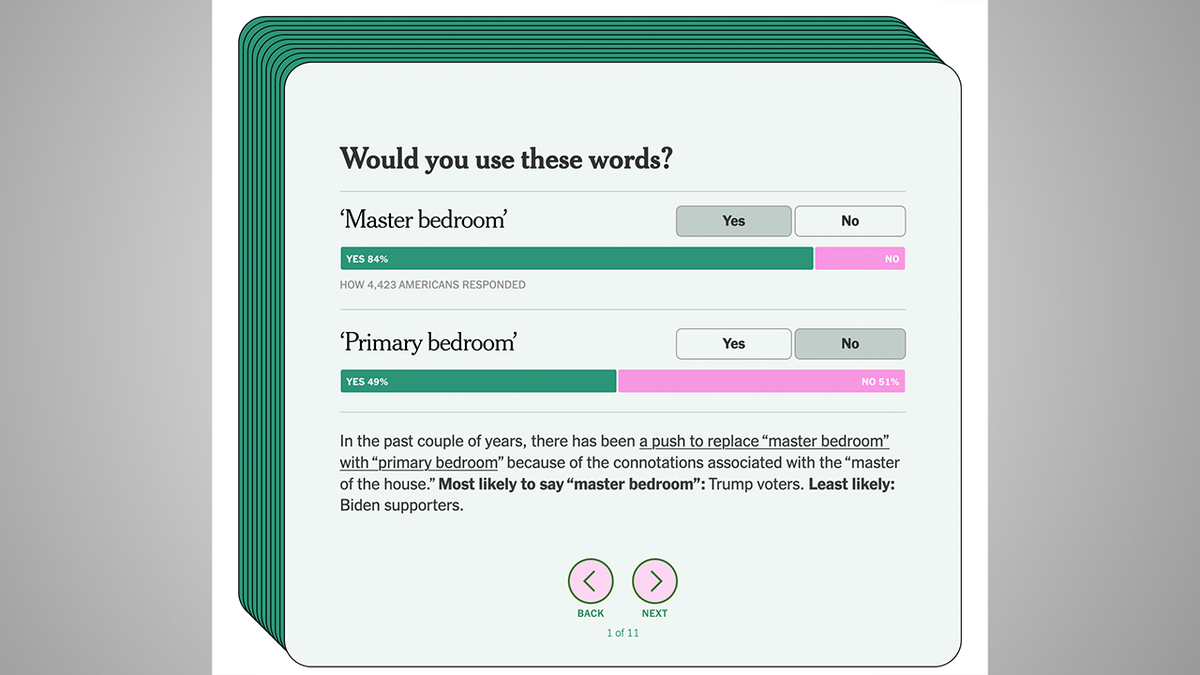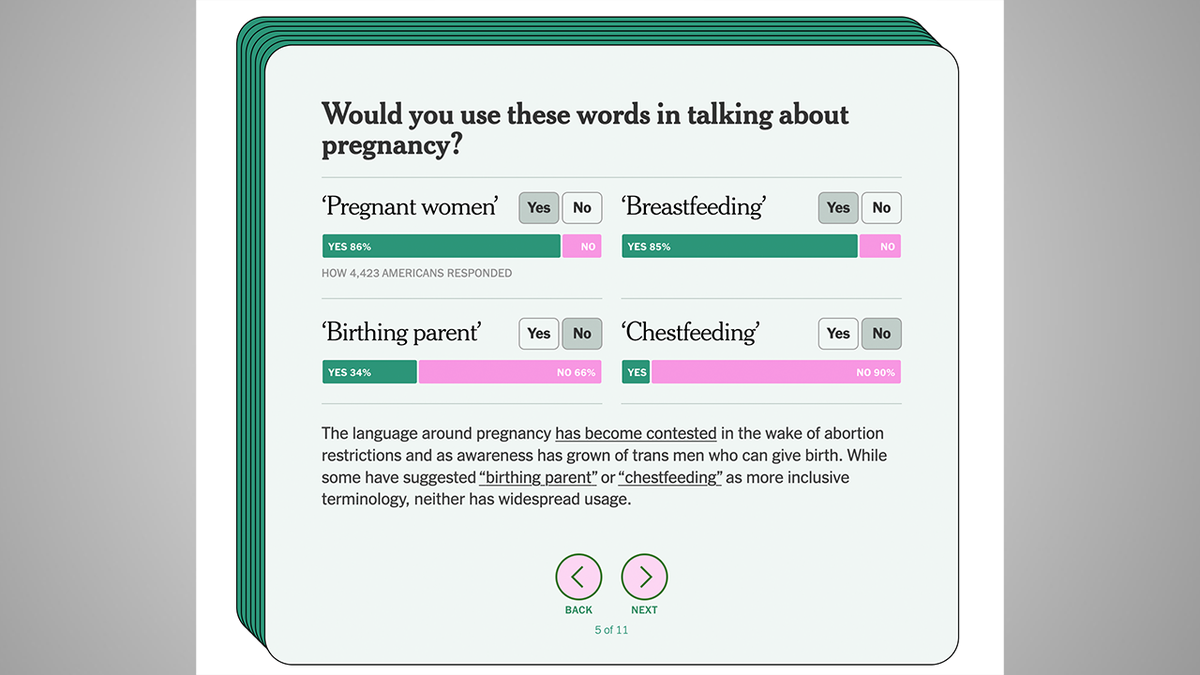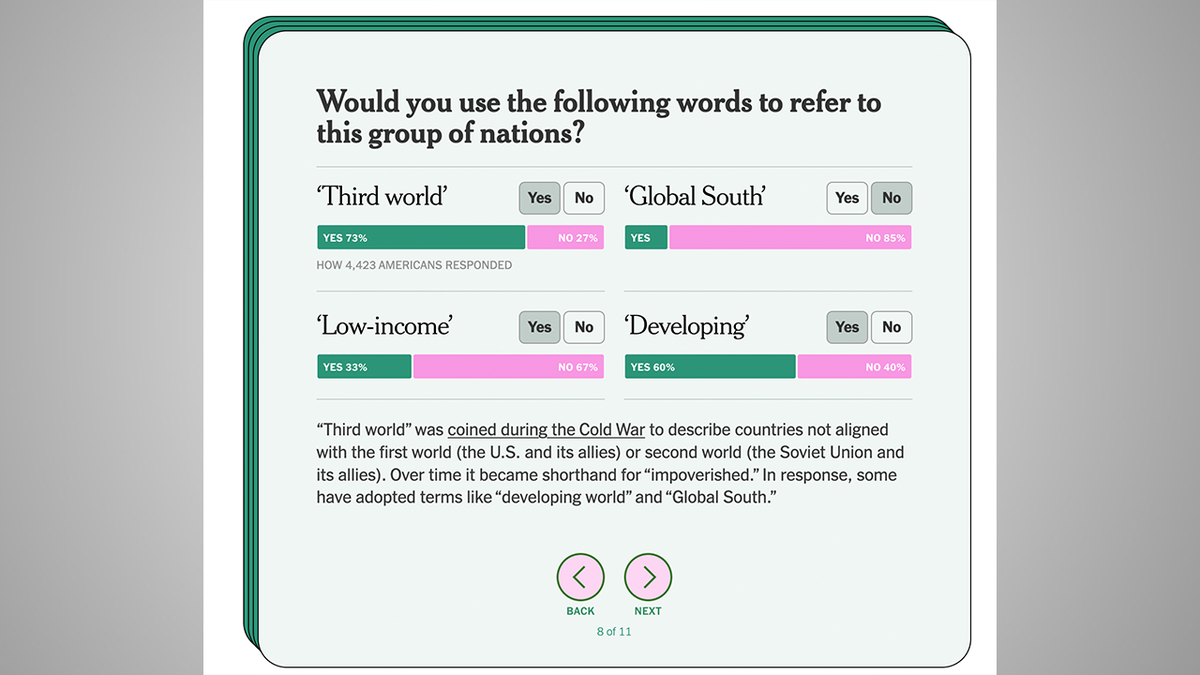Stanford includes 'American' among 'harmful' terms
Fox News contributor Tyrus calls out Stanford University's harmful terms list on 'The Story.'
A New York Times interactive quiz saw the newspapers editors offer revealing opinions about a variety of potentially offensive words, including "pregnant people," "illegal alien," and "master bedroom."
The quiz, found in the publication’s online opinion section, and titled "You Can’t Say That! (Or Can You?)," was highlighted on Twitter by former investigative reporter and congressional candidate Matthew Foldi.
The quiz asks users if they would use certain words or phrases, and showed results based on a Morning Consult survey of the terms. One question asked whether the participant would use the words "master bedroom" or "primary bedroom."

The New York Times quiz asks participants if they would use the words "Master bedroom" or "Primary bedroom." (The New York Time s)
84% of participants said they would use the term "master bedroom," and 49% said they would use the term "primary bedroom." The quiz also noted that there has been a push in recent years to replace the term "master bedroom" with "primary bedroom" because some feel there is a racial history of the former.
Another question asked if the participant would use the term "birthing parent" or "chest feeding," as opposed to "pregnant women" and "breastfeeding," to be more inclusive.
86% of American respondents said they would use "pregnant women" and 66% said they would not use "birthing parent." Additionally, "chest feeding" received overwhelmingly negative responses, with 90% of respondents saying they would not use the term.
Upon completion of the quiz, the webpage unlocks comments from members of the Times Opinion team discussing how they felt about the terms found throughout the quiz.
Times Opinion Graphics Editor Quoctrung Bui said that he recalled debating with colleagues about whether to use "pregnant people" as opposed to "pregnant women" when working on stories about abortion.
"On the one hand, we wanted to be more inclusive of trans men who can get pregnant, but we also didn’t want to erase women, given the vast majority of abortions are had by women and how important this issue was for women historically," he said.

The New York Times quiz results on terms like "Pregnant women" and "Birthing parent." (The New York Times )
Bui also commented on the term "illegal alien," which he described as a "curveball" in the survey results, considering almost half of Americans said they would still say the words.
"I thought most people had stopped using this term," Bui said, noting that The Time had removed the phrase from their own style guide in 2013.
Times Opinion contributing editor Jessica Bennett admitted that she recently used the term "pro-life" on a podcast, but quickly corrected herself to say "anti-abortion," since that is the current phrase used on the left.
Despite her own language policing, Bennett said that it was hard to keep up with the current controversies of word and questioned "who makes the rules, anyway?"
Times Opinion Graphics Editor Sara Chodosh said she was "surprised" to find out that almost three-quarters of Americans said they would use the term "Third World country."
"To me, that’s both a misunderstanding of the original Cold War-era meaning and an antiquated, fairly offensive phrase," she added.
Meanwhile, John McWhorter, a Times Opinion writer on language, often found himself softly pushing back against the accepted language of left-wing ideology. At one point in the comments, McWhorter asserted that the term "master bedroom" did not originate as a term for where slave masters slept.
"But that doesn’t mean there can’t be a discussion as to whether using it now can be taken to suggest that anyway," he added.
CDC'S 'INCLUSIVE' LANGUAGE GUIDE DISCOURAGES SAYING 'ALCOHOLIC,' 'SMOKER,' 'UNINSURED,' 'ELDERLY'

A New York Times quiz on "harmful" language that asks participants about phrases like "third world" and "Global South." (New York Times )
McWhorter also found it unsurprising that the terms acronyms "A.A.P.I" and "BIPOC" had not caught on with the general and were instead the product of "enlightened suggestions" from the "educated and highly activist."
"It isn’t an accident that I learned of all of them on Columbia’s campus," he said.
Discussions about the potential harm of words and their connotations have long been a staple of editorial boardrooms and higher-education research, but conversations about what is deemed "harmful" have only intensified in recent years.
In May, Stanford University announced the Elimination of Harmful Language Initiative which aims to "address harmful language in IT at Stanford."
The guide has 10 "harmful language" sections: ableist, ageism, colonialism, culturally appropriative, gender-based, imprecise language, institutionalized racism, person-first, violent and additional considerations.
CLICK HERE TO GET THE FOX NEWS APP
Included in the words considered harmful is "abort," and the guide states that it should be replaced with "cancel" or "end," citing concerns surrounding the word "abortion."
The guide also states that the word "American" should be replaced with "U.S. Citizen," explaining that "American" is used when discussing "people from the United States only, thereby insinuating that the US is the most important country in the Americas."
Fox News’ Adam Sabes contributed to this report.

